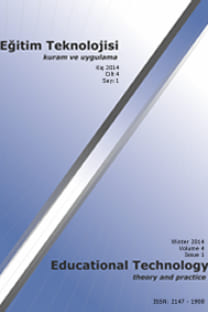Öğretim Elemanı Teknoloji Danışmanlığı Programı: Dönüştürücü Öğrenme Kuramı Bakış Açısı İle Mesleki Gelişim Sürecini İnceleme
THE FACULTY TECHNOLOGY MENTORING PROGRAM IN TERMS OFTRANSFORMATIVE LEARNING THEORY
___
- Akteke Öztük, B., Arı, F., Kubuş, O., Gürbüz, T., ve Çağıltay, K. (2008). Öğretim Teknolojileri Destek Ofisleri ve Üniversitedeki Roller. Akademik Bilişim 2008, (Bildiri kitapçığı No:101). Çanakkale.
- Allen, G. (2008). Practicing teachers and web 2.0 technologies: Possibilities for transformative learning. (Yayınlanmamış doktora tezi). Columbia University, New York.
- Balcı, A. (2001). Sosyal bilimlerde araştırma yöntem, teknik ve ilkeleri (5. Baskı). Ankara: PegemA Yayıncılık.
- Balmer, D. F., ve Richards, B. F. (2012). Faculty development as transformation: Lessons learned from a process-oriented program. Teaching and learning in medicine, 24(3), 242-247.
- Brock, S. E. (2010). Measuring the importance of precursor steps to transformative learning. Adult Education Quarterly, 60(2), 122-142.
- Cranton, P. (1994). Understanding and promoting transformative learning; a guide for educators of adults. San Francisco: Jossey-Bass.
- Creswell, J. W. (1994). Research designs: Qualitative and quantitative approaches. Thousand Oaks, CA: Sage.
- Doering, A. (2006). Adventure learning: Transformative hybrid online education. Distance Education, 27(2), 197-215.
- Earle, R. S. (2002). The integration of instructional technology into public education: Promises and challenges. ET Magazine, 42(1), 5-13.
- Fraenkel, J. R. ve Wallen, N. E. (2003). How to design and evaluate research in education. New York: McGraw-Hill.
- Gravett, S. (2004). Action research and transformative learning in teaching development. Educational Action Research, 12(2), 259-272.
- Griswold, W. (2007). Transformative learning in a post-totalitarian context: Professional development among school teachers in rural Siberia. Yayınlanmamış doktora tezi, Kansas State University, Kansas.
- Hamza, A. (2010). International experience an opportunity for professional development in higher education. Journal of Studies in International Education, 14(1), 50-69.
- Jelfs, A., & Colbourn, C. (2002). Virtual seminars and their impact on the role of the teaching staff. Computers & Education, 38(1), 127-136.
- Kabakci Yurdakul, I. (2011). An Evaluative Case Study on Professional Competency of Preservice Information Technology Teachers. Turkish Online Journal of Educational Technology, 10(3).
- Kabakçı, I, Odabaşı, H. F. ve Kılıçer, K. (2010). Transformative learning based mentoring for professional development of teacher educators in information and communication technologies: an approach for an emerging country. Professional Development in Education, 36:1-2, 263-273
- King, K. P. (2011). Professional Learning in Unlikely Spaces: Social Media and Virtual Communities as Professional Development. International Journal of Emerging Technologies in Learning, 6(4), 40-46.
- King, K. P. (2009). Handbook of the evolving research of transformative learning. Charlotte, NC: Information Age Publishing, Inc.
- King, K. P. (2004). Both sides now: Examining transformative learning and Professional King development. Innovative Higher Education, 29(2), 155-174.
- King, K. P. (2002a). Educational technology professional development as transformative learning opportunities. Computers & Education, 39(3), 283-297.
- King, K. P. (2002b). Keeping pace with technology. Cresskill, NJ: Hampton.
- King, K. P. (2000). Educational technology that transforms: Educators' transformational learning experiences in professional development. In Proceedings of the 41st Annual Adult Education Research Conference (pp. 211-215). Vancouver, BC: University of British Columbia Press.
- Kitchenham, A. (2008). The evolution of John Mezirow's transformative learning theory. Journal of transformative education, 6(2), 104-123.
- King, K. P. (2009). Handbook of the evolving research of transformative learning. Charlotte, NC: Information Age Publishing, Inc.
- Merriam, S.B. ve Caffarella, R.S. (1999). Learning in Adulthood. A Comprehensive Guide, 2.baskı. San Francisco: Jossey-Bass.
- Mezirow, J. (1994). Understanding transformation theory. Adult Education Quarterly, 44(4), 222-232.
- Mezirow, J. (1996). Contemporary paradigms of learning. Adult education quarterly, 46(3), 158-172.
- Mezirow, J. (2000). Learning to think like an adult: Core concepts of transformation theory. In J. Mezirow & Associates (Eds.), Learning as transformation: Critical perspectives on a theory in progress (pp. 3-34). San Francisco: Jossey-Bass.
- Neuman, W. L. (2008). Toplumsal araştırma yöntemleri (3. Baskı). (S.Özge, Çev.). İstanbul: Yayınodası Yayıncılık.
- Smith, K. (2013). Overseas flying faculty teaching as a trigger for transformative professional development. International Journal for Academic Development, 18(2), 127-138.
- Şahin İzmirli, Ö. (2012). Dönüştürücü öğrenme kuramı açısından öğretmen adaylarının bilgi ve iletişim teknolojileri entegrasyonu uygulamaları. (Yayınlanmamış doktora tezi). Anadolu Üniversitesi, Eskişehir.
- Şahin-İzmirli, Ö., Odabaşı, H.F., ve Kabakçı-Yurdakul, I. (2012). Dönüştürücü öğrenme kuramı ve öğretmen yetiştirme üzerine kavramsal bir çözümleme. Anadolu Üniversitesi Sosyal Bilimler Dergisi, 12(3), 169-177.
- Taylor, E.W. (1998) The Theory and Practice of Transformative Learning. A Critical Review, Information Series No. 374. Columbo: ERIC Clearinghouse on Adult, Career and Vocational Education.
- Taylor, E. W. (2007) An update of transformative learning theory: A critical review of the empirical research (1999-2005). International Journal of Lifelong Education,26(2), 173-191.
- Whitelaw, C., Sears, M. ve Campbell, K. (2004). Transformative learning in a faculty professional development context, Journal of Transformative Education, 2(1), 9-27.
- World Links. (2007). Final report on the Asian policy forum on ICT integration into education. http://cache-www.intel.com/cd/00/00/38/07/380769_380769.pdf adresinden 02 Eylül 2012 tarihinde edinilmis?tir.
- Yıldırım, A. ve Şimşek H. (2006). Sosyal bilimlerde nitel araştirma yöntemleri (6. Baskı). Ankara: Seçkin Yayıncılık.
- ISSN: 2147-1908
- Yayın Aralığı: Yılda 2 Sayı
- Başlangıç: 2011
- Yayıncı: Tolga Güyer
İNTERNETE YÖNELİK EPİSTEMOLOJİK İNANÇ ÖLÇEĞİNİN UYARLAMA ÇALIŞMASI
Ebru KILIÇ ÇAKMAK, Yasemin KOÇAK USLUEL, F GİZEM KARAOĞLAN YILMAZ
FATİH PROJESİ ÜZERİNE YAPILAN AKADEMİK ÇALIŞMALARIN İÇERİK ANALİZİ
Hakan İSLAMOĞLU, Hakan İSLAMOĞLU, Ömer URSAVAŞ, Ömer Faruk URSAVAŞ, İlknur RESİOĞLU, İlknur REİSOĞLU
Yükseköğretim Dönüşümünün Eşiğinde Türkiye’de Öğretmen Yetiştirme Sorunları: Bir Model Önerisi
Yasemin Koçak Usluel, Büşra Özmen, Fatma Çelen
FATİH PROJESİ ÜZERİNE YAPILAN AKADEMİK ÇALIŞMALARIN İÇERİK ANALİZİ*
Ömer Faruk URSAVAŞ, Hakan İSLAMOĞLU, İlknur REİSOĞLU
Büşra ÖZMEN, Fatma Kübra ÇELEN, Yasemin USLUEL KOÇAK
Yükseköğretim Dönüşümünün Eşiğinde Türkiye'de Öğretmen Yetiştirme Sorunları: Bir Model Önerisi
Mustafa ÖZÇİFTÇİ, Mustafa ÖZÇİFTÇİ, Recep Çakır
İnternete Yönelik Epistemolojik İnanç Ölçeğinin Uyarlama Çalışması
Ebru KILIÇ ÇAKMAK, F. Gizem Karaoğlan Yılmaz, Ramazan YILMAZ
Ebru KILIÇ ÇAKMAK, Volkan KUKUL, Ekmel ÇETİN, Burcu BERİKAN, Bülent KANDEMİR, Bahattin PAMUKÇU, Necati TAŞKIN, Mehmet MARANGOZ
